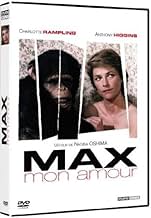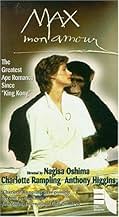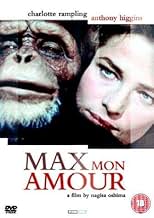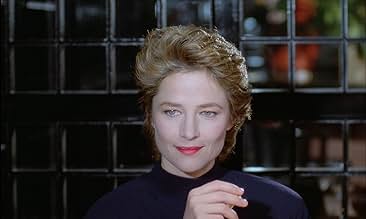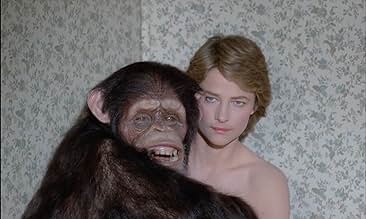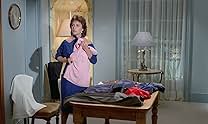VALUTAZIONE IMDb
6,0/10
1371
LA TUA VALUTAZIONE
Aggiungi una trama nella tua linguaA married French woman takes a zoo chimp named Max to be her lover.A married French woman takes a zoo chimp named Max to be her lover.A married French woman takes a zoo chimp named Max to be her lover.
- Regia
- Sceneggiatura
- Star
- Premi
- 2 candidature totali
Bernard-Pierre Donnadieu
- Archibald
- (as Bernard Pierre Donnadieu)
Bonnafet Tarbouriech
- Le vétérinaire
- (as Pierre Bonnafet)
Recensioni in evidenza
The summary on IMDb says "A French wife takes a zoo chimp named Max to be her lover" and this sounds so awful and tasteless that I just had to give it a quick look! So is it distasteful, gross and without merit or is it a comedy or film with something to say?
In this French-English language film, Peter suspects his wife Margaret might be having an affair. So, he hires a detective to follow her and the detective finds she does have a lover...a chimp! Instead of getting a divorce, the very open-minded husband invites her to bring her lover home to live with them!
The most important thing you need to know about this film is that it is NOT explicit or pornographic--at least when it comes to the chimp. Additionally, it's quite the absurdist film because everyone plays it straight and the couple are so chill about the whole bestiality angle...as are many of their friends. This is typical of many of the writer/director Nagisa Ôshima's films. The overall effect is bizarre to say the least but at least the acting is good. NOT a film for everyone...in fact, not a film for MOST people. Mostly because there isn't a lot of meaning behind all this...it's just absurd for the sake of absurdity and isn't actually that entertaining! More one for folks with serious head injuries and unnatural affection for animals! Or, for folks what watch it on a dare!
By the way, the 'chimp' in this movie is VERY obviously some guy in a crappy chimp costume. Also, if some woman was inclined to have a bestial relationship with a chimp, it wouldn't be especially satisfying. Chimp sex routinely lasts less than 5 seconds and the whole beating the woman to death because they are vicious would be a real turn off as well! Also, the detective is played by the legendary French comedy film director and actor, Pierre Étaix.
In this French-English language film, Peter suspects his wife Margaret might be having an affair. So, he hires a detective to follow her and the detective finds she does have a lover...a chimp! Instead of getting a divorce, the very open-minded husband invites her to bring her lover home to live with them!
The most important thing you need to know about this film is that it is NOT explicit or pornographic--at least when it comes to the chimp. Additionally, it's quite the absurdist film because everyone plays it straight and the couple are so chill about the whole bestiality angle...as are many of their friends. This is typical of many of the writer/director Nagisa Ôshima's films. The overall effect is bizarre to say the least but at least the acting is good. NOT a film for everyone...in fact, not a film for MOST people. Mostly because there isn't a lot of meaning behind all this...it's just absurd for the sake of absurdity and isn't actually that entertaining! More one for folks with serious head injuries and unnatural affection for animals! Or, for folks what watch it on a dare!
By the way, the 'chimp' in this movie is VERY obviously some guy in a crappy chimp costume. Also, if some woman was inclined to have a bestial relationship with a chimp, it wouldn't be especially satisfying. Chimp sex routinely lasts less than 5 seconds and the whole beating the woman to death because they are vicious would be a real turn off as well! Also, the detective is played by the legendary French comedy film director and actor, Pierre Étaix.
Interesting - an international co-production that results in a real creative fusion, not the usual mush. This movie pits deadpan surrealist aesthete Jean-Claude Carriere's script against tantrum-prone transgressor Oshima in the service of a narrative where Charlotte Rampling falls in love with a chimpanzee. In spite of the rampant in-your-face perversity, though, Carriere holds the balance of power - Oshima wouldn't have thrown in that climactic victory parade, and I doubt he could have pulled off such an informed spoof of the French bedroom comedy on his own. The bemused passivity of the husband can get a little cloying, but it's pretty remarkable how viscerally sensual the movie gets in the Rampling-chimp lovey sequences. And that goes double once you realize that it ain't no chimp - it's another Rick Baker masterpiece for ya, so that makes three auteurs.
MAX, MON AMOUR received a tepid reaction when it debuted in Cannes in 1986, a French- American co-production under the rein of the late Japanese provocateur Nagisa Ôshima (1932- 2013), which would become his penultimate feature film.
Since then, it has become a succès de scandale which is less being watched than hyped due to its subversive content, but in fact, most of the time, it suffices as a tongue-in-cheek comedy, a marital satire borne out of Jean-Claude Carrière's urtext, Peter Jones (Higgins) is a liberal-minded British diplomat working and living in Paris, one day, to his utter dismay, he finds out the paramour of his wife Margaret (Rampling), is a male chimpanzee named Max, beggar belief, the couple decides to try out a kind of ménage-à-trois by bringing Max into their official residence, where also lives their towhead school-age son Nelson (Hovik), and believe it or not, in the end of the story, their co-habitation actually works.
Cagey about the salacious details of the relationship between Margaret and her "supposed" primate lover, Ôshima sides with the husband's point-of-view to parse the couple's tug-of-war, firstly, Peter takes up the gauntlet to show his magnanimity by accepting the situation without letting it get under his skin, then, driven by curiosity and jealousy, his attitude towards Max seesaws between hostility and respectable concern, an experiment of corroborating the inter- species sexual act is a bust, whereas an episode of shotgun scare is just a cheeky practice of cheap tension.
It is an immoral cock-and-bull story, menace is palpable, but vice has never descended into the picture and what sagaciously affirming is the film's brazen stance on the dynamism between the couple, it is always Margaret who has the say-so in their states of affairs, however preposterous and quixotic, there is a deep respect unites them as an entity, Peter stoutly fights her corner in the face of extrinsic parties, whether it is a zoologist or a neuropsychologist, accordingly, she also quite frank about her feelings, even stays on friendly terms with Peter's secretary-cum-lover Camille (a gratingly loud Diana Quick).
It is a surprise that Ôshima chooses not to go out on a limb in salting the plot by bestowing Max with a feral complexion, alternatively played by real chimps and stunts in verisimilar costumes (solely by this reviewer's reckoning), Max is presented as a meek pet, not dangerous, sulky at most, albeit his human-like size, even becomes mawkishly lovelorn and loses his appetite when Margaret is absent. Granted, there is a touching and tender naiveness seething beneath its surrealistic premise, which also is not exactly congruent with Ôshima's make-up if one might venture to surmise.
Both Rampling and Higgins tackle the thorny subject with bravura, what percolates from their collective effort is a beguilingly unfeigned sophistication stemming from a bourgeois background, and Ôshima conspiratorially sends up their caprices with deadpan seriousness, not to mention a non sequitur triumph appended to the part where Max momentarily goes missing in the woods.
Ultimately, MAX, MON AMOUR doesn't come to provoke moralists, but offers a keyhole for the audience to observe a behavioral pattern says as much of living beings' universality as their idiosyncrasy, the point is made, but reverberations are somewhat deadened when Ôshima settles for a middle road between "funny and die" in his overall approach.
Since then, it has become a succès de scandale which is less being watched than hyped due to its subversive content, but in fact, most of the time, it suffices as a tongue-in-cheek comedy, a marital satire borne out of Jean-Claude Carrière's urtext, Peter Jones (Higgins) is a liberal-minded British diplomat working and living in Paris, one day, to his utter dismay, he finds out the paramour of his wife Margaret (Rampling), is a male chimpanzee named Max, beggar belief, the couple decides to try out a kind of ménage-à-trois by bringing Max into their official residence, where also lives their towhead school-age son Nelson (Hovik), and believe it or not, in the end of the story, their co-habitation actually works.
Cagey about the salacious details of the relationship between Margaret and her "supposed" primate lover, Ôshima sides with the husband's point-of-view to parse the couple's tug-of-war, firstly, Peter takes up the gauntlet to show his magnanimity by accepting the situation without letting it get under his skin, then, driven by curiosity and jealousy, his attitude towards Max seesaws between hostility and respectable concern, an experiment of corroborating the inter- species sexual act is a bust, whereas an episode of shotgun scare is just a cheeky practice of cheap tension.
It is an immoral cock-and-bull story, menace is palpable, but vice has never descended into the picture and what sagaciously affirming is the film's brazen stance on the dynamism between the couple, it is always Margaret who has the say-so in their states of affairs, however preposterous and quixotic, there is a deep respect unites them as an entity, Peter stoutly fights her corner in the face of extrinsic parties, whether it is a zoologist or a neuropsychologist, accordingly, she also quite frank about her feelings, even stays on friendly terms with Peter's secretary-cum-lover Camille (a gratingly loud Diana Quick).
It is a surprise that Ôshima chooses not to go out on a limb in salting the plot by bestowing Max with a feral complexion, alternatively played by real chimps and stunts in verisimilar costumes (solely by this reviewer's reckoning), Max is presented as a meek pet, not dangerous, sulky at most, albeit his human-like size, even becomes mawkishly lovelorn and loses his appetite when Margaret is absent. Granted, there is a touching and tender naiveness seething beneath its surrealistic premise, which also is not exactly congruent with Ôshima's make-up if one might venture to surmise.
Both Rampling and Higgins tackle the thorny subject with bravura, what percolates from their collective effort is a beguilingly unfeigned sophistication stemming from a bourgeois background, and Ôshima conspiratorially sends up their caprices with deadpan seriousness, not to mention a non sequitur triumph appended to the part where Max momentarily goes missing in the woods.
Ultimately, MAX, MON AMOUR doesn't come to provoke moralists, but offers a keyhole for the audience to observe a behavioral pattern says as much of living beings' universality as their idiosyncrasy, the point is made, but reverberations are somewhat deadened when Ôshima settles for a middle road between "funny and die" in his overall approach.
Mainly, this film is about Charlotte Ramplings love for a monkey (a chimpanzee, to be precise), and how her family, especially her husband, deals with it. In fact, upon finding out about his wives affair, Anthony Higgins' character remains surprisingly calm; he even proposes to have the monkey live with them in their house. Maybe he wants to prevent Rampling from leaving him; or he does so since he has an affair himself; or it is his attempt to be "open minded" even in front of an utmost unusual matter. But problems soon up: Not only does the maid (young Victoria Abril!) respond negative to the new guest; the couples friends slowly find up about the hidden secret and try to "help" by drawing in psychologist, zoologists, and so forth. Then, suddenly, Max, the monkey is gone... Sounds weird? It is. All over the film, one is reminded of some of Luis Bunuels work. In one particular scene, Higgins eager to find if Rampling and Max do indeed share sexual experiences pays a prostitute to "visit" Max, about which she has no problems (other than Max!). One could read it as a commentary about, once again, the lifestyle of the Bourgeoisie and the boredom that drives them, but in fact all of the characters are likable and there's not hint of criticism on social inequalities. It's filmed in a "children film style" way, yet in its contents designed exclusively for adults. It makes for an enjoyable reception, but once you've seen it, it's not something you want to watch it all too soon, since "Max mon Amour" is basically attractive for the unpredictable unfolding of the story.
I watched this film as a part of a film class that I take. For the first time I really liked a Oshima film as I watched it and not only after we talked about it. The story crosses all kinds of lines of what love is and how it can be felt by anybody or anything. All and all a good film to see. Note that for 1986 Rick Bakers effects are the most life-like I have seen of a monkey. Sometimes you even think it is a the real thing
Lo sapevi?
- QuizOshima originally intended there to be a scene where Max performs cunnilingus on Margaret, but ultimately decided it would be too risque for French cinema.
- ConnessioniFeatured in The Look (2011)
I più visti
Accedi per valutare e creare un elenco di titoli salvati per ottenere consigli personalizzati
- How long is Max My Love?Powered by Alexa
Dettagli
- Data di uscita
- Paesi di origine
- Lingue
- Celebre anche come
- Max My Love
- Luoghi delle riprese
- Aziende produttrici
- Vedi altri crediti dell’azienda su IMDbPro
Contribuisci a questa pagina
Suggerisci una modifica o aggiungi i contenuti mancanti


